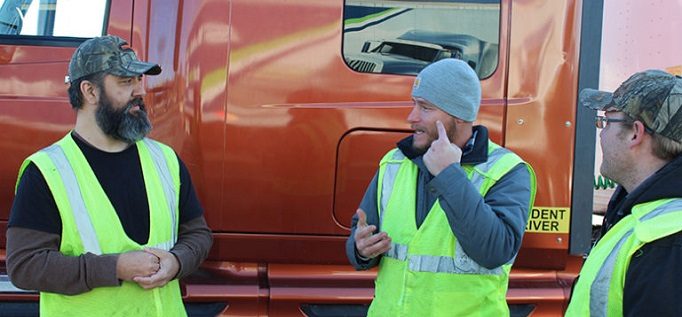Driving past the naysayers
By Rene Dulle, Lysa Young-Bates and Nez Savala
February 12, 2020
Fortitude and a supportive environment help a man reach a workforce goal.
Jason Clark grew up in a family culture surrounded by cars, hauling them to scrap yards, picking up run-down junk cars and driving in demolition derbies. With all of this mobility, he learned to drive and haul vehicles on 18-foot trailers – a responsibility he loved.
Clark worked construction, a career he enjoyed, yet he kept returning to a personal wish of becoming a professional truck driver. The challenge? Earning a commercial driver’s license (CDL) required more effort for him because he is deaf.
Deaf truck drivers, a developing horizon
Recent developments by the U.S. Department of Transportation (DOT) have opened possibilities for hearing impaired or deaf individuals to become over-the-road truck drivers. Previously, inability to pass a hearing test and verbally answer questions in the DOT physical exam created a hard stop for applicants. Now, individuals can petition and request a waiver for accommodations.
“Deaf people have good visual acuity and pay attention,” Clark said. “We drive regular cars without interpreters all of the time.”
In fact, national groups such as the Communication Service for the Deaf and the National Association of the Deaf have advocated for changes in the CDL physical exams. Still, the process for applicants takes time. For Clark, it took six months to get his waiver approved.
“It wasn’t easy at all,” he said.
The pursuit carries multiple benefits, though, for Clark and for the industry. With this shift, deaf drivers who earn their CDL can now drive across state lines, opening significant employment opportunities and building a workforce pipeline for an industry in need of workers.
Rene Dulle, senior program manager at St. Louis Community College’s (STLCC) Workforce Solutions Group (WSG), explained that the college began preparing for hearing-impaired drivers early on.
“As a member of the National Association of Publicly Funded Truck Driving Schools, our entry hurdles were eased greatly since we could share ideas and learnings with a network of other educators around the country,” Dulle said.
Additional resources include connections to vocational rehabilitation to help students with disabilities locate and help fund training.
The college’s CDL-A professional truck driving program, offered through WSG, quickly prepares individuals for the growing number of truck-driving job openings. According to the Bureau of Labor Statistics (BLS), the median annual wage for truck drivers was $43,680 in May 2018. BLS reports that as the demand for goods increases, more truck drivers will be needed to keep supply chains moving.
To date, STLCC is the only community college in Missouri to offer such support for hearing-impaired or deaf students interested in CDL training.
Valuable job skills in a supported environment
On a bright, chilly morning in early December, Clark walked with interpreter Jesse Schlueter toward a truck parked in a lot at STLCC’s Forest Park campus. Throughout the day, Schlueter and fellow interpreter David Henley took turns to communicate with Clark and the instructors.
Clark confidently climbed into the driver’s seat of a 73-foot combination tractor-trailer to perform an offset maneuver — parallel parking the truck — in an area marked by orange traffic cones as instructors signaled to him with hand gestures common in teaching truck driving to all students.
“Jason seems to have above-average spatial awareness and good problem-solving skills,” Henley said. “With his technical skills and ability to navigate training and the tractors, he’s doing great.”
“The instructors are willing to work with us and with Jason, and they’re listening to our advice,” added Schlueter. “He’s doing well. He’s setting the bar pretty high.”
Emily Duck, a CDL driver instructor, agreed with Schlueter. “Jason does set the bar high. He pays more attention to everything.”
As Clark earned recognition for his efforts and growth, the interpreters and STLCC staff were also quick to note the successful collaboration amongst the team.
“Communication has been easier than anticipated. We’ve learned to communicate in the moment with no confusion,” said Seth Owen, a professional truck-driving supervisor for STLCC.
“Jason is the first deaf or hearing impaired student in the CDL training program at STLCC,” explained Duck. “It’s new for everybody, and it is fun to learn new techniques and how to communicate.”
Pushing forward, forging a new path
Dulle credits advanced planning among WSG, STLCC’s access office and deaf services coordinator in ensuring potential deaf students’ positive experience in the college’s truck driving program.
STLCC instructors worked with other community colleges throughout the nation to understand effective training practices that support deaf truck driving students – pre-route discussions; agreed-upon hand signals for turning, slowing, shifting, stopping, etc.; positioning of instructors and interpreters during on-the-road training and timing of communication.
The college also met with Missouri Highway Patrol to better understand CDL testing accommodations so they could appropriately prepare deaf and hearing-impaired students.
When STLCC learned that Clark would join the CDL program, meetings with staff, instructors, sign language interpreters and Clark were held before the class started. Staff reviewed the format of the class and common American Sign Language, and they met with Clark to learn about his interests and give him a chance to learn about them.
Since completing the accelerated five-week professional truck driver training at STLCC and earning a CDL, Clark has started his new career with Jewel Trucking LLC.
There’s more to the story! Read the full article in CC Daily.



